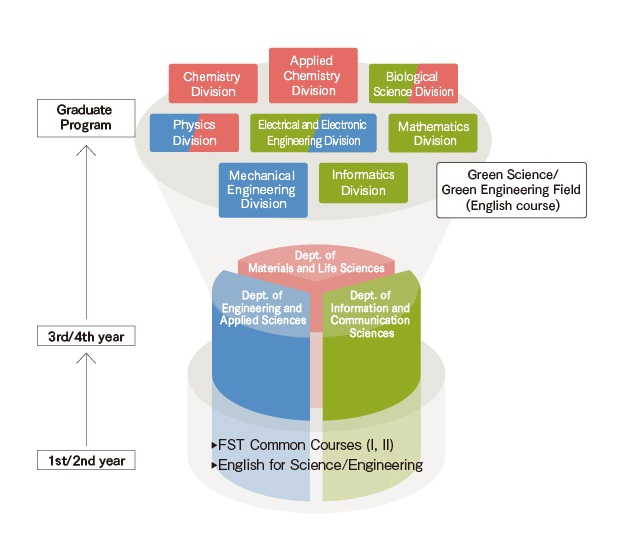Faculty of Science and Technology
- Department of Materials and Life Sciences
- Department of Engineering and Applied Sciences
- Department of Information and Communication Sciences
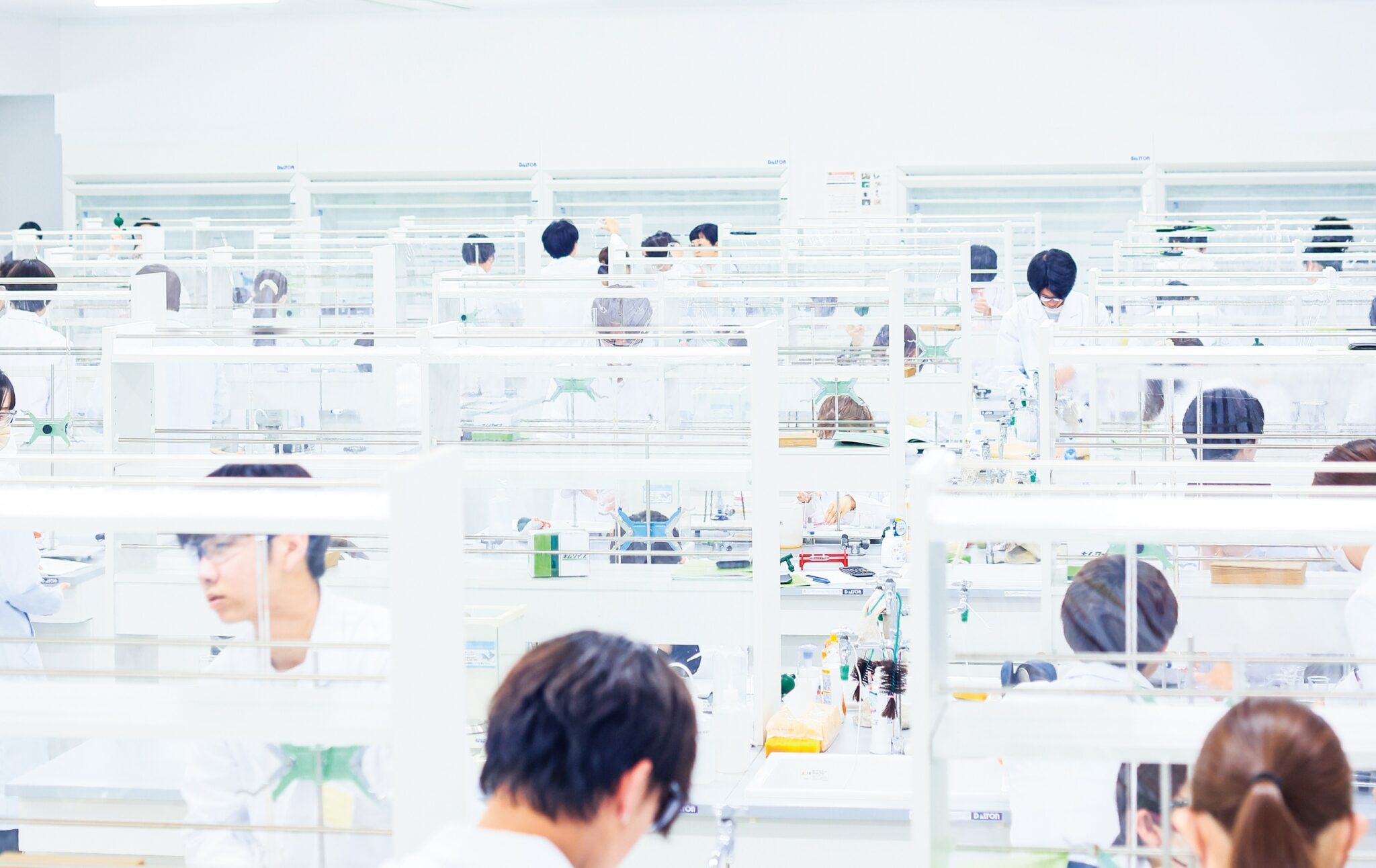

Learning at the Sophia Faculty of Science and Technology | Expertise and cross-disciplinary knowledge cultivated at Sophia
A new era of science and engineering for people and the Earth, leading to solutions to the complex challenges of modern society
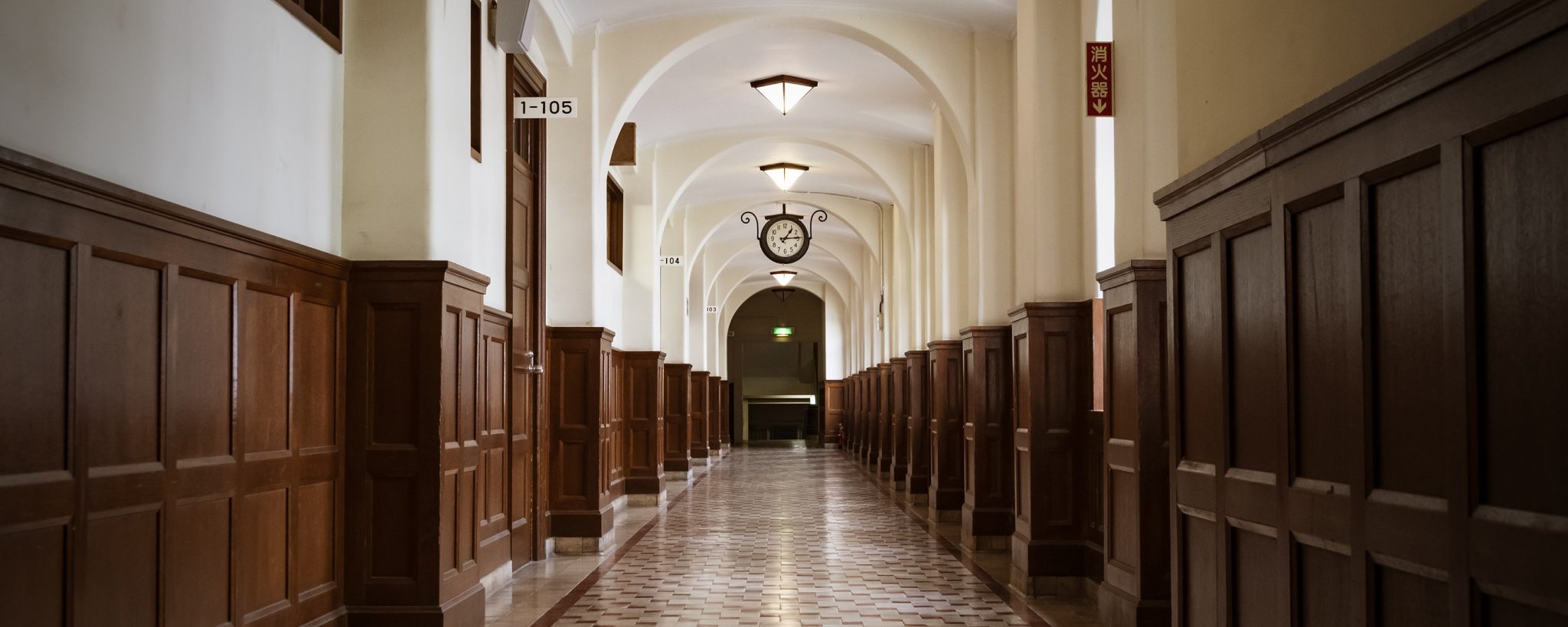
#Sophian
Sophia Students who study at the Faculty of Science and Technology
Facing the challenges in front of you with an emphasis on scientific thinking. Listening carefully and sincerely to opinions that differ from your own. Many students with such a sincere attitude are studying at the Sophia Faculty of Science and Technology. This faculty is an environment where students can not only gain scientific knowledge but also broaden their horizons and discover future possibilities through exposure to different ways of thinking.
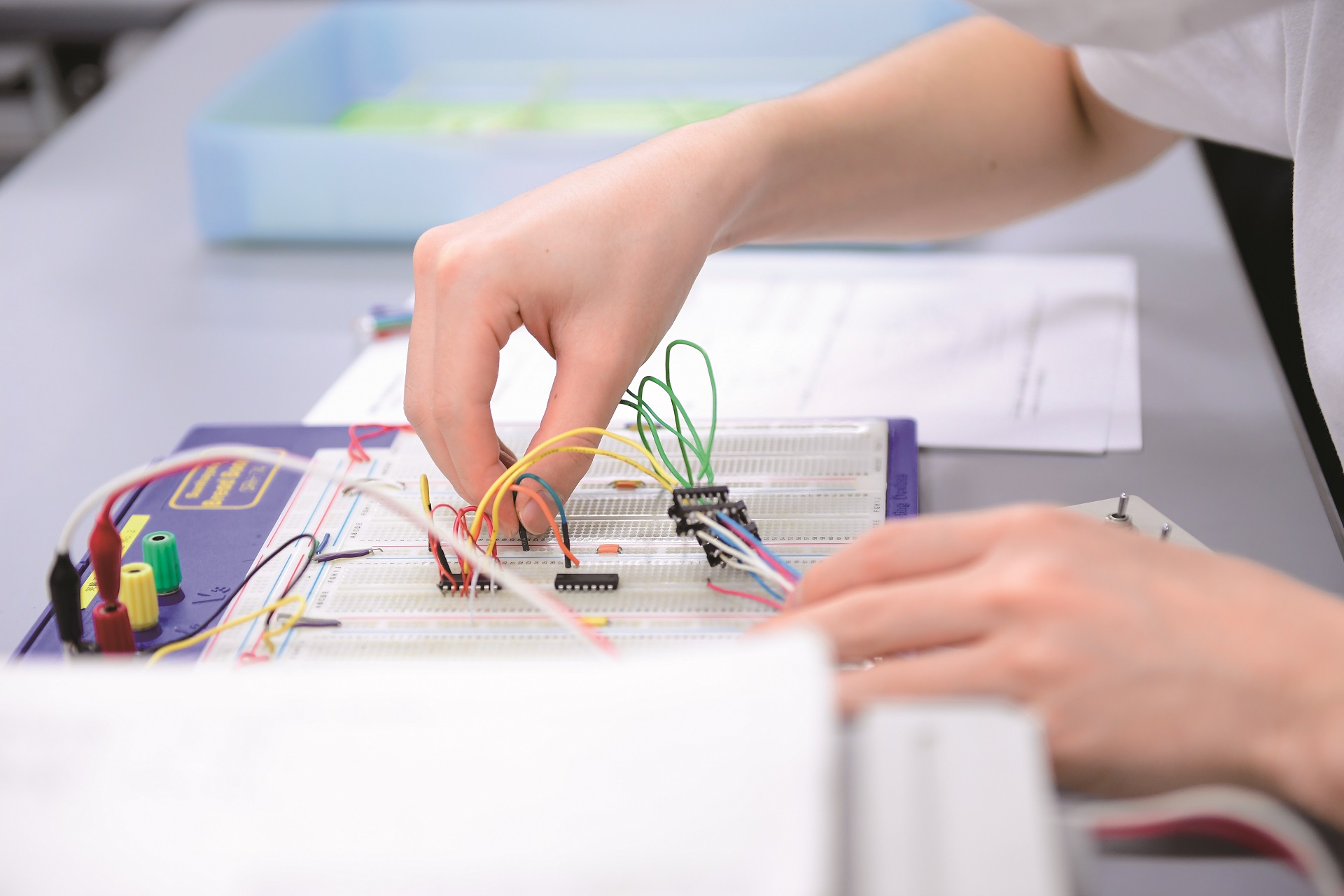
#Self-Discovery
Finding and refining a specialty
The Department of Materials and Life Science, the Department of Engineering and Applied Sciences, and the Department of Information and Communication Sciences provide students with cross-disciplinary and specialized studies that cover multiple fields. After acquiring a solid foundation, each student can find and deepen the specialization that he or she is aiming for. The faculty members, all of whom are specialists in their respective fields, will strongly encourage every student’s ambitions.
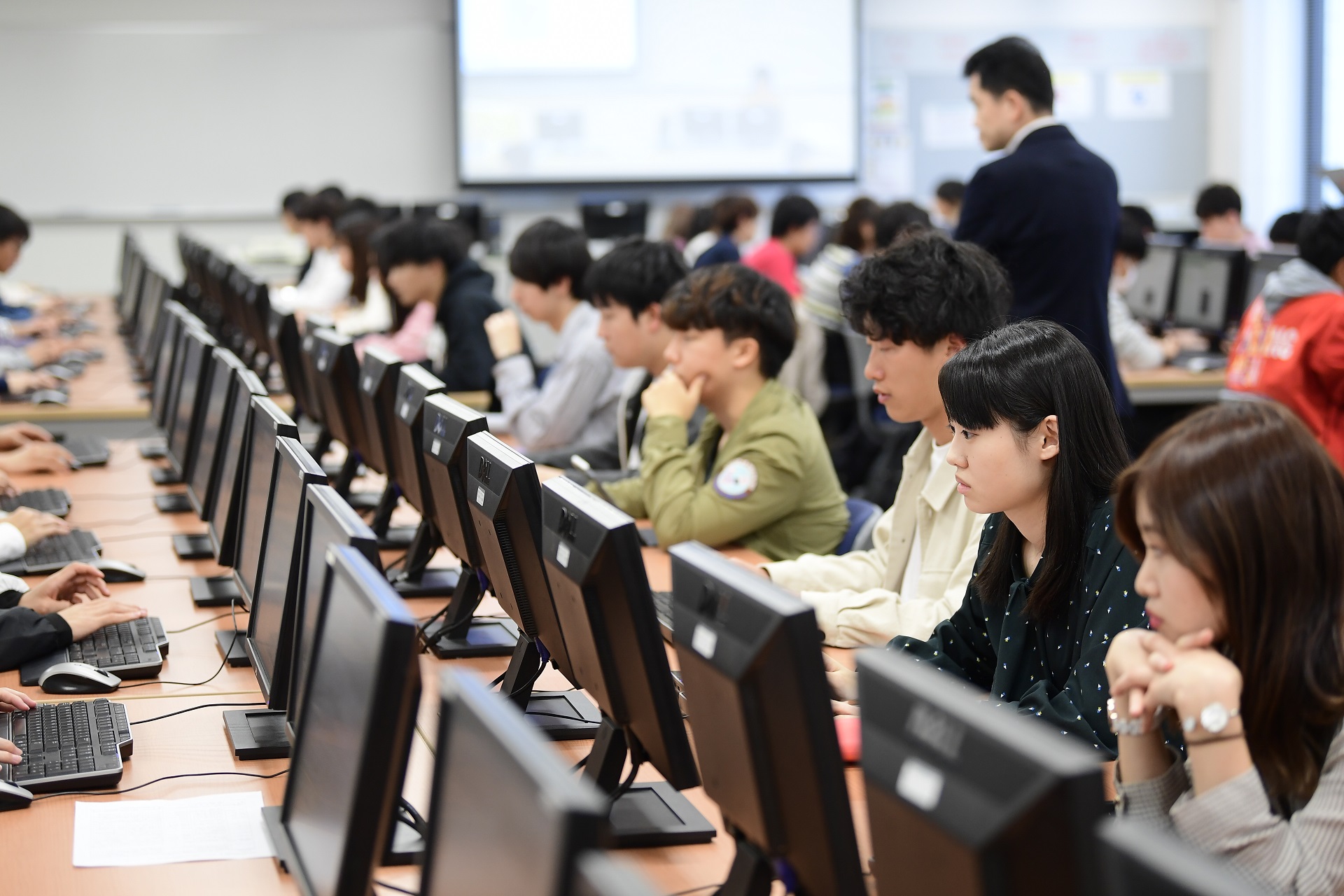
#One campus
Cross-disciplinary knowledge based on a solid liberal arts background
Knowledge and perspectives in one specialized field alone can limit the breadth of one’s research. In this respect, Sophia University, where both humanities and science students study on the same campus, offers students the opportunity to cultivate a wide range of insights, including those in the humanities and social sciences. Through daily classes, clubs, and other interactions, students will naturally acquire a broad interdisciplinary background.
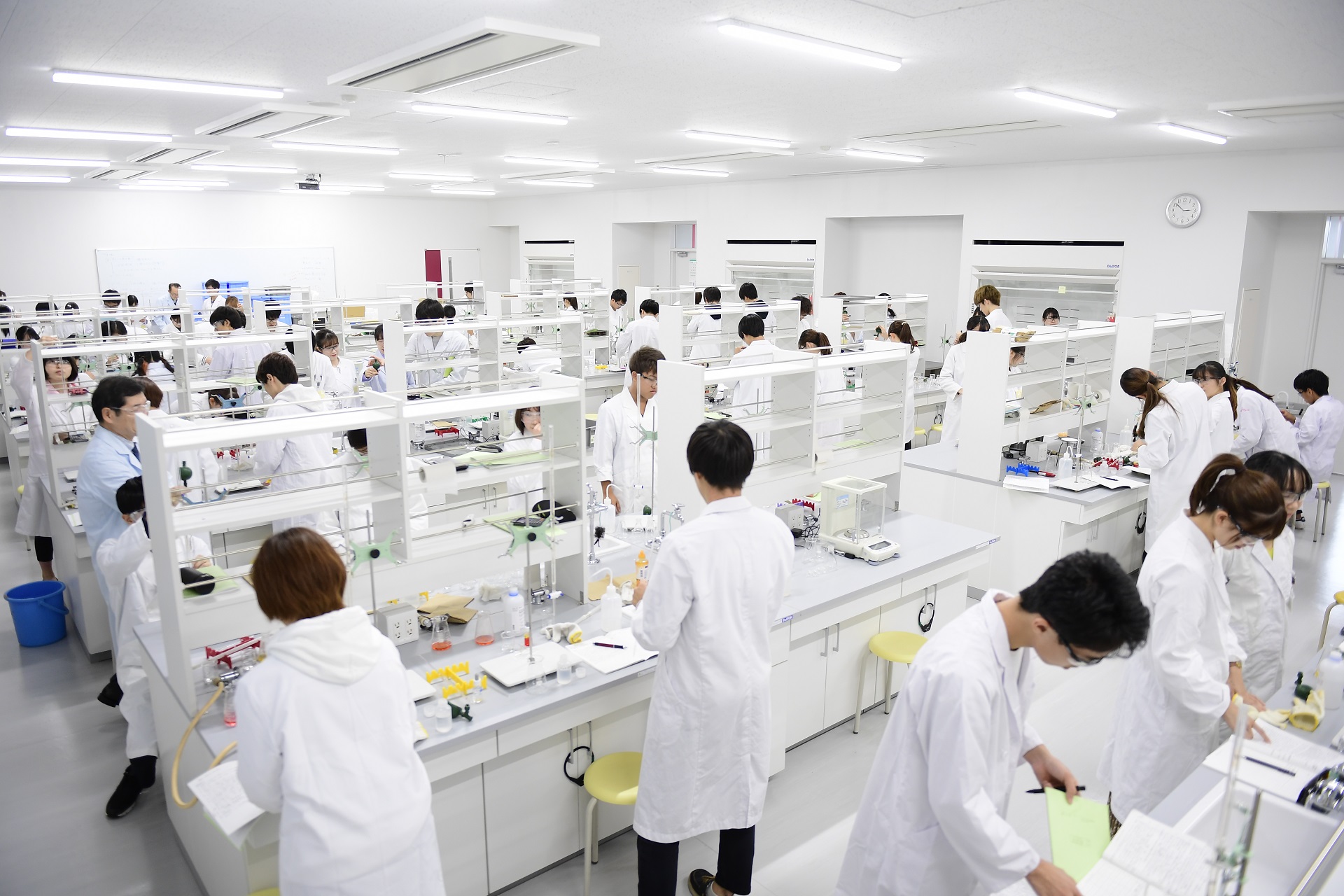
#Global
Develop international competence in a diverse environment
Language skills and an international outlook are more important keys than might be imagined when conducting research activities, such as reading international academic journals and making presentations at international conferences. The faculty has an English course in which many international students study, and it is not uncommon for them to conduct practical training and research together. Together with various programs, we will enrich every student’s “internationalness.”
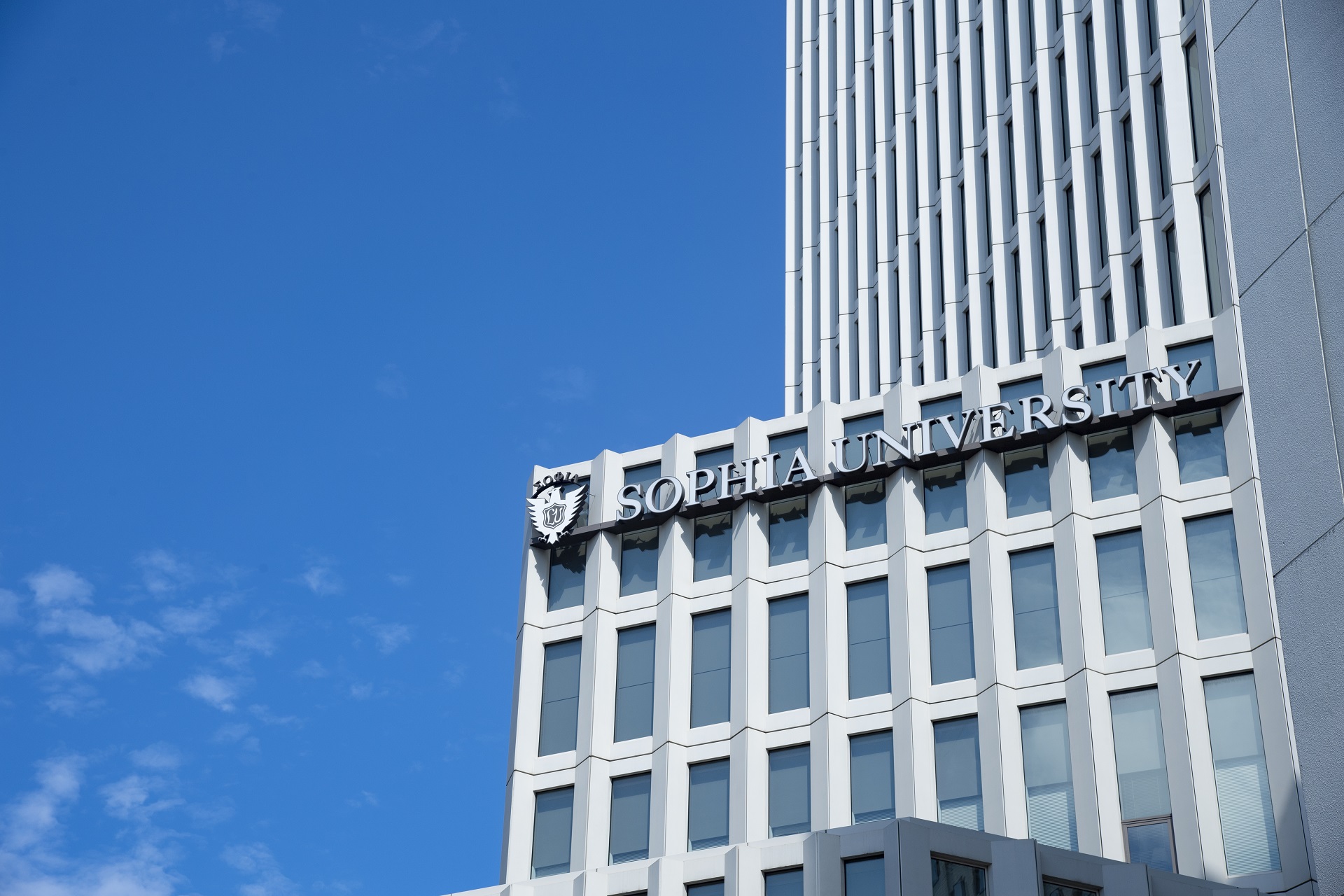
#Sophia Science and Technology
What it means to learn at the Faculty of Science and Technology
Science and technology have evolved through repeated new discoveries and creations. In university studies, it is important to be aware of the importance of inheriting the achievements of our predecessors and connecting them to the next challenge. On the other hand, depending on how it is used, science and technology can cause social disorder and environmental destruction. A sense of being for and with others is crucial as well.
About the Faculty of Science and Technology
-
In order to nurture the ability to adapt to the rapid development of science and technology and the diversification of society, education that not only imparts knowledge but also develops creativity is necessary. The Faculty of Science and Technology has three departments that integrate related disciplines while utilizing traditional knowledge systems such as mechanical engineering, electrical and electronic engineering, mathematics, physics, and chemistry. The faculty fosters people with a wide range of knowledge and insight. In addition, we also focus on English education in order to cultivate internationally competitive scientists.
- Small-group education system
Taking advantage of the small number of students per faculty member, we provide friendly support to each student. For example, students can feel free to consult with faculty members regarding the selection of courses to take and the choice of specialized fields and career paths. In addition, guidance for graduation research is also available.
- Thorough basic education
In the first and second years, there are compulsory courses in many fields covering the entire range of science and engineering, providing students with peripheral knowledge to expand their future areas of specialization as well as their applications. We also emphasize communication with faculty members and offer a full range of experiments and exercises.
- English Education
We cultivate English language skills in science and technology, which are essential for reading overseas literature and presenting research in international forums. The program provides instruction in vocabulary acquisition, information dissemination in English, presentations, question-and-answer sessions, and writing papers.
-
Science and technology are undergoing rapid transformation, and society is diversifying. The ability to cope with these changes is what the Sophia University’s Faculty of Science and Technology advocates: “Cross-disciplinary Knowledge.” Cross-disciplinary Knowledge is the ability to transcend one’s own specialty. By having a firm specialty in the field of one’s interest and using that as a foothold to go beyond the specialty, the ability to link related fields will flourish when becoming a researcher or engineer in the future.
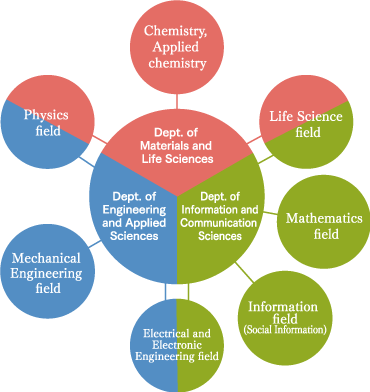
- Chemistry / Applied Science
Chemistry deals with a wide range of fields that support our lives, including life, energy, and new materials. We study the synthesis of substances with new functions, the mechanisms of compound structure and function expression, and more efficient and sustainable chemical reactions. There is also research on environmental issues brought about by chemicals, covering a wide range of fields.
[Main Research Fields] Green Chemistry and Environmental Chemistry / Functional Materials / Metal Complexes and Supramolecular Chemistry / Next-Generation Batteries / Natural Organic Compounds / Highly Functional Polymers / Theoretical Molecular Design and Molecular Spectroscopy
- Physics
Physics is the study of the fundamental laws governing the natural world, and research takes place both experimentally and theoretically. The results of this research have not only led to an understanding of the laws of nature, but also to the development of new materials and technologies that have supported the development of humankind. The research targets of modern physics extend from microscopic systems such as atoms and molecules described by quantum mechanics to the diverse materials they produce.
[Main Research Fields] Elementary Particles / Nuclei / Astrophysics / Atomic Molecules / Superconductivity / Quantum Spin / Quantum Beams / Lasers
- Mechanical Engineering
Mechanical engineering is the starting point of all industries. We conduct research on both the hardware and software elements of industry and aim to create new manufacturing and systems by developing creative systems that integrate design, analysis, and experimentation, with the aim of future manufacturing that is friendly to the environment and people.
[Main Research Fields] Computational Mechanics / Biomechanics / Advanced Transportation Systems / Mechanical Dynamics / Highly Efficient Engines / Heat-Transfer Engineering / Fluid Engineering / Aerospace Engineering / Robot Control / Automatic Operation Control / Precision Engineering / Energy-related Materials / Biomaterials
- Electronics, Electrical Engineering
<Semiconductors> Understanding the properties of semiconductor materials and the principles of device operation, we create optical and electronic devices and functional materials that are indispensable for smartphones, automobiles, and other devices with advanced functionality.
[Main Research Fields] Semiconductor lasers / LEDs / Nanocolumns / Optical control devices
<Energy> Understand the mechanisms of electricity generation, transmission, and utilization, and contribute to a sustainable society by utilizing renewable energy and superconductivity and applying them to transportation systems. We will contribute to a sustainable society by understanding the mechanisms of electricity generation, transmission, and utilization, and by utilizing renewable energy and superconductivity and applying them to transportation systems, etc.
[Main Research Fields] Renewable Energy Generation and Utilization / Superconducting Applied Devices / Electric Railways
<Information and Communication> We are pursuing technologies for transmitting information using radio waves and light, aiming to improve communication speed and quality, conserve energy in communication systems, and realize robust information security.
[Main Research Fields] loT/AI Networks / Wireless/Optical Communication Systems
- Information
To establish a human-friendly information society, it is essential to have information technology that enables us to use valuable information suitable for our purposes. We aim to construct systems that are beneficial to people and society by efficiently utilizing the knowledge, wisdom, and experience of people, businesses, organizations, and society at large as manifested information.
[Main Research Fields] Information Systems / Production Systems / Software Production Technology / Combinatorial Optimization / Evolutionary Computation / Database / Information Media Communication
- Mathematics
Mathematical approaches are essential to all scientific fields, not to mention the study of mathematics itself. In particular, in the information field, advanced mathematics is used for artificial intelligence and speeding up information systems. Studying the various theories of mathematics contributes to the development of science and technology and the expansion of its applications in society.
[Main Research Fields] Mathematical Finance / Integer Theory / Functional Algebra / Group Theory / Quantum Groups / Algebraic Geometry / Topology
- Life Science
<Life Science> The Earth is full of living organisms, including humans, and life science is the most familiar of all disciplines, yet the phenomena of life are still shrouded in mystery. While conducting basic research aimed at unraveling the mysteries of life phenomena, the University is also taking on the challenge of developing biological materials and technologies to solve the problems facing the Earth and humankind.
[Main Research Fields] Nucleic Acid Molecules / Genes / Evolution / Development / Cell Organelles / Biological Movement / Environmental Response / Neurons
<Human Information> In this course, students learn the fundamentals of applying information technology to human-related fields. We will pursue both human and information aspects, such as human sensory and physical mechanisms, brain mechanisms, image and sound recognition, and the use of information in education, medicine, and welfare, and use informatics for the development of society.
[Main Research Fields] Brain / Neurology / Memory / Learning / Speech / Image Processing / Sensing Engineering / Educational Technology / Welfare Informatics
-
Faculty of Science and Technology (English Program)
In September 2012, two English courses—the Green Science Program in the Department of Materials and Life Sciences and the Green Engineering Program in the Department of Engineering and Applied Science—were established. In both courses, all classes, examinations, reports, research guidance, and thesis writing are conducted in English in order to develop people who can take on the global issue of global environmental problems.
“English for Science and Technology” Curriculum
Two English programs (Green Science Program and Green Engineering Program) in the Department of Materials and Life Sciences, and Department of Engineering and Applied Sciences are designed to prepare individuals who are capable of tackling global environmental issues. In these courses, all lectures, examinations, reports, research guidance, and thesis writing are conducted in English. The Green Engineering Course is an outstanding science and engineering education program of international standard in English, which is available to both international and Japanese students. Courses in this program are also open to other students in the Faculty of Science and Technology if they meet a certain level of language proficiency. The program brings together students with a wide range of educational backgrounds, providing a unique learning opportunity at Sophia University, which is rich in international diversity, while still being in Japan.
- Second Year
English Education Course
Students may choose one of Mathematics, Applied Mathematics, Physics, Chemistry, Biology, or Information Sciences, and take English for Science and Technology to acquire technical terms, idioms, and forms of expression that enable them to understand and write dissertations and papers on science and technology in English. Students may take any of the designated courses (English, elective courses) offered throughout the university.
- Third / Fourth Year
Short-Term Study Abroad
Short-term study abroad programs at designated overseas universities, where students receive language training and take classes in science and engineering courses at the local university, are recognized as credits earned.
English Language Course
Students can take courses in the English course attached to the department and study while interacting with students from overseas.
- Fourth Year
Writing Bachelor’s Thesis, Submitted papers in English
Learn how to write scientific and technical papers in English.
- Graduate School
Writing Master’s Thesis, Submitted paper in English
Learn how to write scientific and technical papers in English.
The short-term overseas training program
The short-term overseas training program for science and engineering students includes two programs: a one-month English training program and company visits at the University of California, Davis in the U.S., scheduled for August; and a one-month English training program at the University of North Carolina at Charlotte in the U.S., scheduled for March, where research, discussions, and other activities will be conducted in English. The program aims to improve overall communication skills. In addition to improving language skills, the program also offers opportunities to experience local education and cutting-edge science and technology and to visit laboratories and companies that produce such science and technology. This program is unique to the Faculty of Science and Technology.
-
Graduate school is a place for more advanced specialized education and research. The greatest feature of our Graduate School is that it offers eight fields of study in one school, which can be directly connected to the specialized fields studied at the undergraduate level. In September 2013, the Graduate School also launched an English-language course (Green Science and Engineering), bringing the total number of graduate school courses to nine. Motivated undergraduate students can take courses designated in advance by the Graduate School of Science and Engineering in their fourth year of the undergraduate program, and these courses will be recognized as pre-entrance credits within a specified range after entering graduate school at Sophia University. There is also a written exam waiver system for graduate school entrance examinations.
-
The Faculty of Science and Technology conducts activities to support and nurture outstanding female researchers. One of the key activities is the Global Mentoring System. Aiming at international exchange not only for students but also for researchers, researchers who are active overseas are assigned as mentors to provide advice and academic guidance not only through individual consultations but also through classes, lectures, and exchange events. This helps female students who want to step up to the next level to form a concrete image of their future in which they will be more active. Furthermore, we are proactively working to support female researchers and nurture the next generation by establishing a common space that female students and faculty can freely and comfortably use for breaks, childcare, and socializing.
Educational Objectives and Policies
-
To have students gain academic knowledge of a specialized field as their foundation and acquire “cross-disciplinary understanding,” which is characterized by a wide range of knowledge that would enable them to view other fields objectively, through art/humanities-science integrated education, so that they can contribute to solving various problems in today’s highly diversified society.
-
To foster human resources who can contribute to “scientific and technological development” by solving various problems in today’s highly diversified society with a broad vision acquired through knowledge of a specialized field and “cross-disciplinary understanding”.
-
The Faculty of Science and Technology aims to foster human resources who have gained understanding of the Christian humanism spirit and have acquired the ability to solve, with a broad and international perspective, the various scientific and technological issues challenging today’s highly diversified society, and who can pursue original research based on high ingenuity and creativity and thus contribute to the further advancement of science and technology. With a view to this aim, each department sets standards for the skills and knowledge students should have acquired upon graduation as described herein. Those who have fulfilled the requirements and have passed the thesis defense will be awarded a diploma.
-
In accordance with the diploma policy, the Faculty of Science and Technology construct its curriculum as follows:
- To acquire fundamental abilities to solve scientific and technological issues from a broad international perspective through coursework in lecture-based Faculty of Science and Technology Categories I and II General Courses which students should commonly take.
- Based on the above, to acquire specialized abilities through Departmental Core Courses centered on seminars and laboratory classes and to acquire the ability to pursue research with originality through Specialized Courses characterized by higher expertise.
-
The Faculty of Science and Technology seeks students who are interested in the science and technology embraced by today’s internationally diversified society:
- Those who have acquired knowledge and a cultural appreciation of mathematics, natural science, and English, which are required for studying specialized courses in science and engineering
- Those who are logical thinkers, possess a broad perspective, and have strong communication skills in association with various problems in science and technology; and
- Those who have an inquiring mind and are eager to unravel the mysteries surrounding natural phenomena and/or create technological innovations in science and technology.
Departments
Department of Materials and Life Sciences
Through understanding the fundamentals of materials and the creation and technological development of new materials, students will acquire a new view of materials and life that is in harmony with nature, and contribute to people and society.
Department of Engineering and Applied Sciences
Students study science and engineering in an integrated manner to become creative professionals who can promote the harmonious development of industrial technology and natural science.
Department of Information and Communication Sciences
We aim to develop a deep understanding of people and society through “information,” to organize the knowledge, wisdom, and experience of humans and society as information, and to become creative people who can organically combine them and give back to society.
